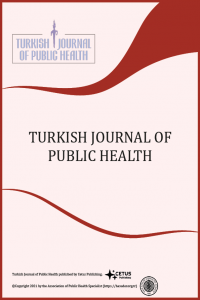Eşcinsel ve biseksüel erkeklerin içselleştirilmiş homofobi düzeyi ve sağlık üzerine etkileri
Amaç: Cinsel yönelimleri sebebiyle eşcinsel bireyler; toplum tarafından dışlanmakta, yaftalanmakta ve ayrımcılığa uğramaktadırlar. Toplumda eşcinsel bireylere karşı geliştirilen önyargı ve ayrımcılığın; eşcinsel bireylerde duygu-durum ve anksiyete bozukluklarını, alkolmadde kötüye kullanımını ve intihar riskini artırdığı öne sürülmektedir. Bu sebeplerden dolayı eşcinsel bireylerin sorunları bir halk sağlığı sorunudur. Bu çalışmanın amacı; gey ve biseksüel erkeklerin içselleştirilmiş homofobi düzeylerini ve ruh sağlığına etkilerini saptamaktır. Yöntem: Tanımlayıcı tipteki bu çalışmaya; Lambdaistanbul Derneğinin yardımı ile kartopu yöntemi ile ulaşılan, 210 eşcinsel/biseksüel erkek dahil edildi. Veriler İstanbul ili Beyoğlu İlçesinde, 21 Nisan - 24 Haziran 2012 tarihleri arasında, bireylere gözlem altında anket uygulanarak elde edildi. Anket; sosyodemografik özellikler, madde kullanımı, cinsel yönelimleri ile ilgili yaşadıkları sorunlar ve intihar davranışlarını kapsamaktaydı. İçselleştirilmiş Homofobi Ölçeği, Beck Depresyon Ölçeği (BDÖ) ve Genel Sağlık Anketi-12 (GSA-12) uygulandı. Bulgular: Katılımcıların %21.9’unda içselleştirilmiş homofobi vardı. Ailesi homofobik olan, eşcinselliği günah kabul eden, her gün alkol kullanan bireyler kendi cinsel yönelimlerine karşı homofobik bulundu. Logistik regresyon analizinde; 25 yaş üzerinde içselleştirilmiş homofobi olma olasılığı azalırken, gey bireylerin içselleştirilmiş homofobi yönünden biseksüel bireylerden daha riskli olduğu, eğitimle içselleştirilmiş homofobi riskinin azaldığı görüldü. Sonuç: Eşcinsel erkeklerin yaklaşık beşte birinde içselleştirilmiş homofobi vardır. Toplumsal homofobinin azaltılmasına yönelik halk sağlığı çalışmalarının, eşcinsel bireylerin içselleştirilmiş homofobilerinin azaltılmasına ve buna bağlı olarak psikolojik ve fiziksel sağlıklarının gelişimine faydalı olacağı düşünülmektedir.
The internalized homophobia level of the homosexual and bisexual men and its effect on the health
Objective: Homosexual individuals are often alienated and stigmatised by society and exposure to discrimination. The prejudice and discrimination coming from society are assumed to increase emotional and anxiety disorders as well as alcohol and substance abuse and the risk of suicide in homosexual individuals. Therefore, the problems of homosexual individuals are issues of public health. The aim of this study is to determine the internalized homophobia levels of gay and bisexual men and the impact of this on their mental health. Method: 210 homosexual or bisexual men, who were accessed by the snowball method, were included in this descriptive study with the help of the Lambda Istanbul Association. The data were collected by using a selfreporting questionnaire under supervision, in the Beyoğlu District of Istanbul Province, between April 21 – June 24 2012. The questionnaire included sociodemographic characteristics, substance abuse, problems relating to sexual orientation and suicidal tendencies. The internalized homophobia scale, the Beck depression scale and General Health Questionnaire-12 were applied. Findings: Of the participants, 21,9% had internalized homophobia. Individuals who have homophobic families, who believe that homosexuality is a sin and who use alcohol everyday were regarded as homophobic against their own sexual orientation. In a logistic regression analysis, it was found that whereas suffering from internalized homophobia decreases after the age of 25, gay individuals have more risk than the bisexual individuals of internalized homophobia and the risk of internalized homophobia declines with education. Conclusion: Almost one fifth of homosexual men have internalized homophobia. It is assumed that public health efforts towards decreasing the homophobia would be beneficial for decreasing the internalized homophobia of the homosexual individuals and in relation to this, would be beneficial for their psychological and physical improvement.
